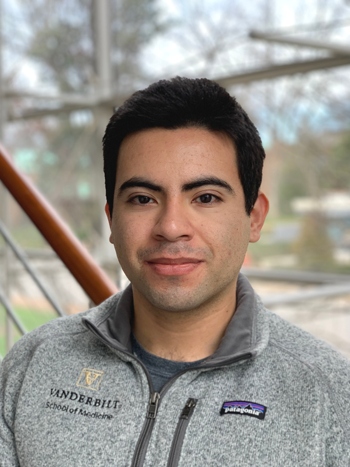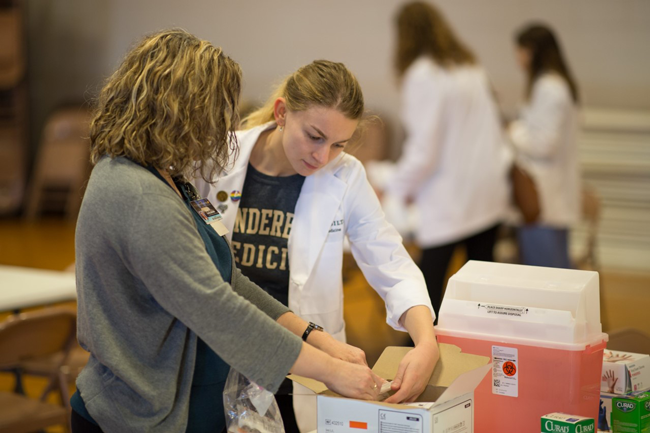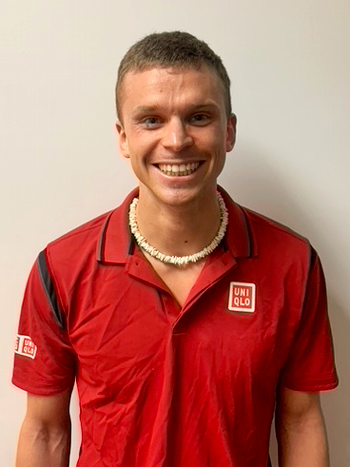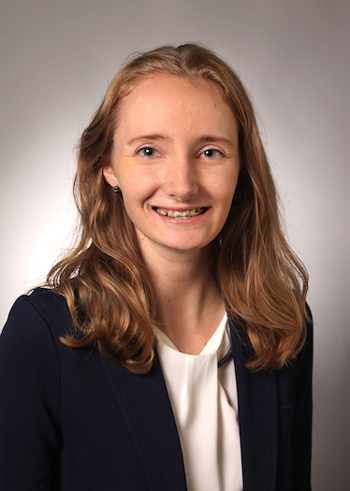Robert F. Miller Service Awards announced; recipients share their motivation and goals for service work
by Emma Mattson
We’re excited to celebrate the 2019-2020 recipients of the Robert F. Miller Award for Community Service and Engagement: Carlos Ortega (VMS1), Sarah Brown (VMS2), Grant MacKinnon (VMS3), Kaitlyn Reasoner (VMS4), and Danny Sack (MSTP).
The Robert F. Miller Award was established in 2018 and recognizes five students for their commitment to service. Today, the award lives under the purview of the Social Mission Committee, which selects students for the award based on a variety of factors, including number of service hours, dedication to longitudinal service, and community engagement.
“We decided to create a service award to honor current efforts that students have been engaged in around service,” third-year medical student Peety Kaur said, “especially highlighting students that have really gone out of their way to seek opportunities and do longitudinal service, despite being super busy med students.”
Kaur, who spearheaded the foundation of the award two years ago, said the award showcases the Vanderbilt community’s overall commitment to service. Between February 2019 and February 2020, the entire medical student body logged 3,274 service hours.
The award is named for Dr. Robert Miller, co-founder and current medical director of the Shade Tree Clinic.
“This is an award that’s very much in line with who he is as a person and what he has meant to Vanderbilt Medical School and especially Shade Tree,” Kaur said.
Besides the five recipients, the Social Mission Committee also honored eleven finalists: Kelsey Barter, Ekiomoado Olumese, Julie Lee, Maggie Rutherford, Jessa Fogel, Michelle Weyhaupt, Bronson Wessinger, Saif Hamdan, Michelle York, Alexandra Sundermann, and Rachel Brown.
We spoke with four medical student award recipients to learn more about what service means to them and how it has changed their outlook on medicine.
 Carlos Ortega (VMS 1)
Carlos Ortega (VMS 1)
Ortega served as Spanish Interpreter at Shade Tree Clinic (STC) during his first year in medical school. He has also served as a pre-clinical student at STC, at Flulapalooza, and with the COVID-19 Poison Center hotline.
My parents immigrated to the US before I was born, and for most of my childhood, they were not insured. As a result of this, I was also exposed to health disparities from a young age and I observed Latino and other immigrant populations in the Bay Area being unable to access health care services. This was the foundation of my desire to pursue a career in medicine.
Growing up with parents who did not speak English and were learning it at the same time I was, has been influential to me as I saw firsthand how difficult it is to navigate the health care and social welfare systems when you do not speak or read English. Through my service opportunities in Boston and now in Nashville, I have been able to help populations who face similar barriers as my parents.
My volunteer experiences have reinforced the fact that cost is a major deterrent to seeking out health care services. As a result, I will take socioeconomic concerns into account and utilize health team members, like social workers and nutritionists, to meet the needs of each patient. I also believe that doctors should be advocates for their patients and communities, and I will endorse and campaign for legislation that expands social safety nets and provides insurance for all Americans.
 Sarah Brown (VMS 2)
Sarah Brown (VMS 2)
Brown has served as a Vaccine Outreach Coordinator, a Preclinical Volunteer, and a clinical volunteer at Shade Tree, as well as with organizations like Siloam Health, the Jefferson Bridge Ministry, Room in the Inn, and Open Table Nashville, among others.
My most formative volunteer experience was with Flying Samaritans at UCLA. When I was an undergraduate at UCLA, I worked with a small community in the hills of Mexico by running a monthly student-run free clinic, staffed by volunteer physicians, called Flying Samaritans at UCLA. All of our patients had medical problems that could be traced back to poverty and structural violence. Without proper sanitation, the running water was not safe to drink, yet soda in the local markets was less expensive than bottled water. It was nearly impossible for our diabetic patients—many of whom had devastating sequelae of uncontrolled diabetes—to avoid high-sugar sustenance. As President of the clinic, I spent more hours trying to address structural problems than medical. When I think of the experiences that drive me to become a doctor – and drive the service I do now – I always turn to Flying Samaritans.
I would argue that my service experiences are why I am becoming a doctor and are absolutely inseparable from that mission. I plan to become an internal medicine doctor who uses my role in the community to advocate for the underserved while I incorporate uninsured patients into my practice. Access to quality health care is a basic human right. I am becoming a doctor so I can directly provide these services to patients. To me, it is a human rights battle as much as anything.
 Grant MacKinnon (VMS 3)
Grant MacKinnon (VMS 3)
MacKinnon serves with organizations like Room in the Inn and Achilles Nashville, an organization that pairs running guides with less-abled athletes in community and exercise. He has also built eleven Little Free Libraries for free healthcare clinics around Nashville.
At my undergraduate university, service and justice outreach was a cornerstone for spring and fall breaks. Committing myself, with my classmates, to these trips provided unforgettable experiences and deep relationships with the communities we served. Thus, these experiences served me in showcasing how enjoyable outreach can be and its lasting impact.
Being a physician to me means to promote well-being and health to all persons. Most people recognize that only a fraction of well-being and health are confined to the realm of a clinic or hospital. To be truly most effective, we need to look outside of our “workplace”. I hope my experiences will continually challenge me to evaluate my efforts and resources and avoid complacency.
 Kaitlyn Reasoner (VMS 4)
Kaitlyn Reasoner (VMS 4)
Reasoner has volunteered at Shade Tree for all four years in medical school, starting as a social worker during her first year. She also helped coordinate an annual outreach to provide free hand and upper extremity surgeries to patients from Shade Tree and other free clinics in the middle Tennessee area.
I’m an alumna of Berea College, a federally recognized work college in Kentucky. In exchange for labor in an on-campus job, Berea provides a no-tuition education to low income students. Berea and its values really transformed my life and continue to influence my perspective. Its emphasis on educational equality, hard work, social justice and sustainable community is truly exemplary and can certainly be applied to health care. I’m so grateful that I had the opportunity to attend college and now medical school. I hope I’ve been a good steward of the resources and training that have been poured into me so that I can now go forward and help others.
I am incredibly excited and thankful to be staying here at Vanderbilt for my internal medicine residency! I hope to remain involved with Shade Tree during residency. I’ll likely pursue subspecialty training after residency, and I hope to use those specialized skills and expertise to care for underserved patients in my future career.
Content has been edited for clarity and length.